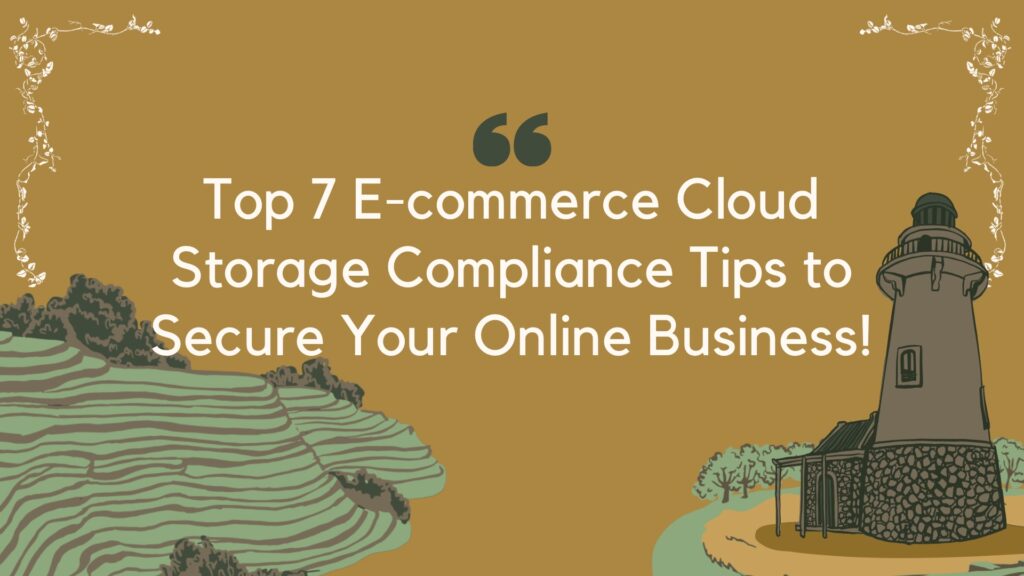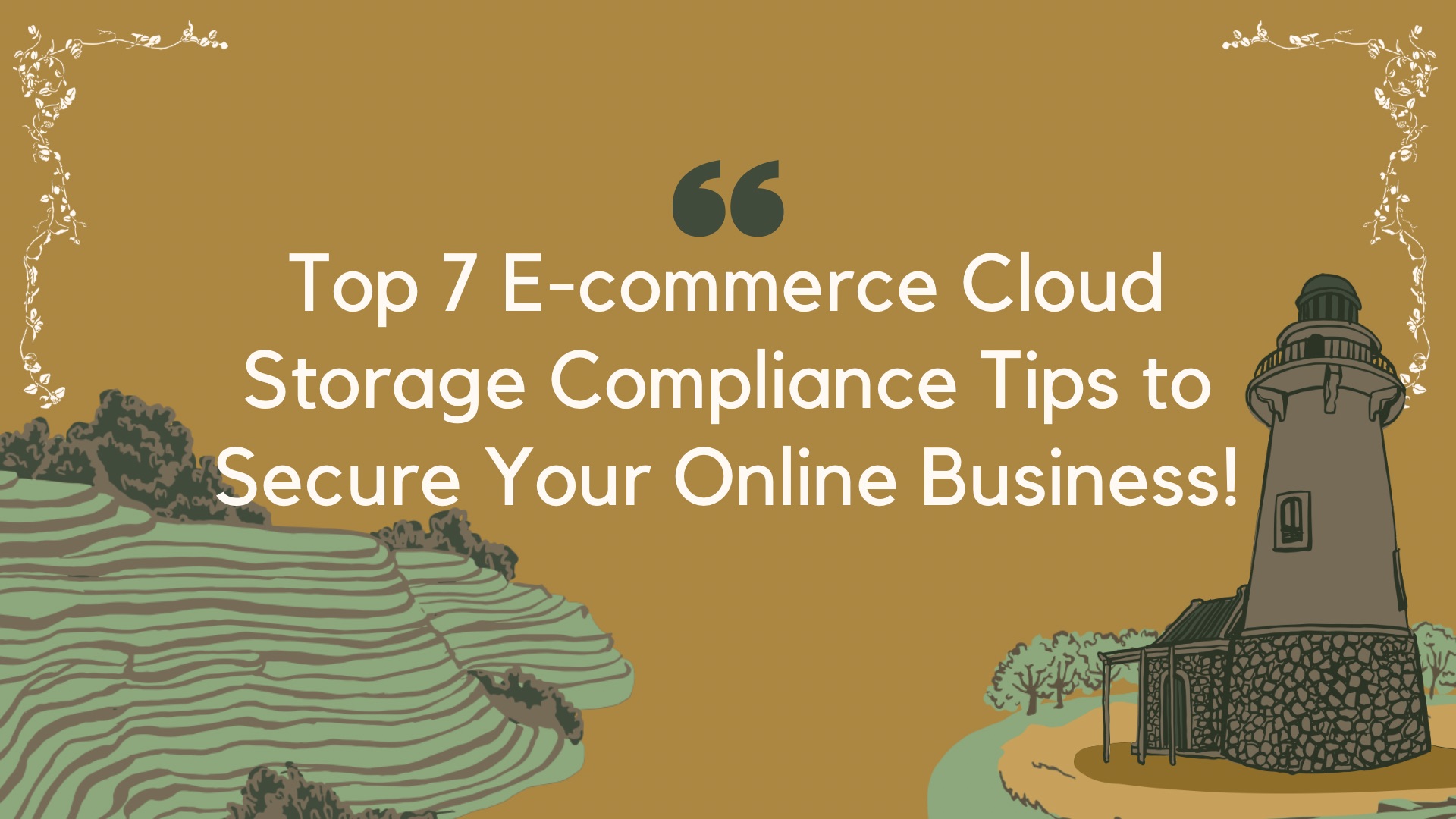If you’re running an online store, knowing the best e-commerce cloud storage compliance tips is essential to protect your business and your customers.
With all the personal data you’re handling; like credit card details, shipping addresses, and more, you need to make sure everything is stored safely in the cloud and that you’re following the right rules.

We’ve all heard horror stories about companies getting hacked or fined for mishandling customer data.
And it’s not just the big corporations that need to worry, small businesses are at risk too. Governments worldwide have set strict regulations, like the GDPR (General Data Protection Regulation) in Europe and the CCPA (California Consumer Privacy Act) in the U.S., to protect people’s data. These laws don’t just apply to large companies—they apply to every online business, including yours.
But here’s the good news: following the rules and staying compliant doesn’t have to be complicated.
By using the right strategies, you can protect your customers’ data and avoid costly fines or even losing customer trust. Ready to learn how? Let’s dive into the top 7 e-commerce cloud storage compliance tips that will keep your online store safe, secure, and legal.
Why Cloud Storage Compliance Is a Big Deal
So why is cloud storage compliance such a big deal for e-commerce? Think of it like this: if you had a physical store, you’d make sure to lock the doors every night, right? You wouldn’t just leave the cash register open.
Well, it’s the same with your customers’ data. If you don’t take steps to secure it, it’s like leaving your store wide open for hackers to walk in and take whatever they want.
But it’s not just about keeping criminals out. There are legal reasons to make sure your data storage practices are up to scratch. Different countries have different regulations, and if you’re selling to customers around the world, you need to make sure you’re complying with the right ones.
If you don’t, you could face hefty fines, lawsuits, or worse—your customers might stop trusting you.
Top 7 E-commerce Cloud Storage Compliance Tips to Secure Your Online Business!
Now, let’s get into the top 7 e-commerce cloud storage compliance tips to make sure you’re protecting your business and staying on the right side of the law.
1. Know the Regulations That Affect Your Business
The first thing you need to do is figure out which data protection laws apply to your business. Different countries have different rules. For example, if you have customers in Europe, you’ll need to follow GDPR (General Data Protection Regulation). If your store has customers from California, you’ll need to comply with CCPA (California Consumer Privacy Act).
This might sound a bit overwhelming, but it’s easier than you think. Just take some time to research the laws that affect your online store. Understanding the basics will help you avoid a lot of headaches later on.
2. Pick a Cloud Storage Provider That Gets Compliance
One of the easiest ways to make sure you’re staying compliant is by choosing a cloud storage provider that takes security seriously. Not all cloud services are created equal, so look for one that offers strong security features and complies with the regulations you need to follow.
Check if your cloud provider has certifications like ISO/IEC 27001, which shows they follow best practices for data security. If you have customers from different countries, make sure your provider’s data centers are located in areas that comply with the regulations you need to follow.
3. Encrypt All Your Data
Encryption is one of the simplest ways to protect your data. It’s like putting your customer info into a locked box, only people with the key can unlock it. When you encrypt your data, even if someone does manage to break into your cloud storage, they won’t be able to read anything without the decryption key.
Make sure your cloud provider offers end-to-end encryption, meaning your data is protected both when it’s being sent to the cloud and when it’s stored there. This is a must-have for keeping your customers’ information safe and complying with data protection laws.
4. Use Strong Authentication for Extra Protection
In today’s world, passwords alone just aren’t enough. To protect your cloud storage, you need strong authentication methods like two-factor authentication (2FA). It’s basically an extra layer of security, after entering a password, you’ll need to enter a second code (usually sent to your phone) to access your data.
Setting up 2FA is quick and easy, and it can make a huge difference in keeping your data safe from hackers. Encourage your employees to use it, and if possible, offer it as an option for your customers too.
5. Control Who Has Access to Your Data
Think about who actually needs access to your customers’ data. Not everyone on your team should have the same level of access. Set strict permissions to make sure only authorized employees can view or edit sensitive information.
You can also use tools to track who’s accessing what data and when. This way, you’ll always know if something suspicious is happening and can take action right away.
6. Stay Updated on Security Features
Cyber threats are constantly evolving, so your security measures should too. Make sure you’re regularly updating your cloud provider’s security features and applying the latest software updates. Don’t ignore those update reminders—they often include patches for vulnerabilities that hackers could exploit.
Being proactive about updates can help you avoid major problems down the line.
7. Perform Regular Compliance Audits
Finally, the best way to stay on top of your compliance game is by conducting regular audits. This involves reviewing your data storage practices to make sure everything’s up to code with the latest regulations. Audits can help you spot potential problems before they turn into major issues.
Think of it as a routine checkup for your business. By catching weaknesses early, you can fix them before they become a serious threat.
Wrap-Up: Keep Your Business Safe and Compliant
By following these top 7 e-commerce cloud storage compliance tips, you’re not only keeping your business secure but also building trust with your customers. When people know you’re serious about protecting their personal info, they’re more likely to stick with you.
So, take a little time to ensure your cloud storage is safe, compliant, and ready to handle whatever comes your way. Don’t wait for a security breach or legal trouble to remind you—start protecting your business today by clicking this link.










